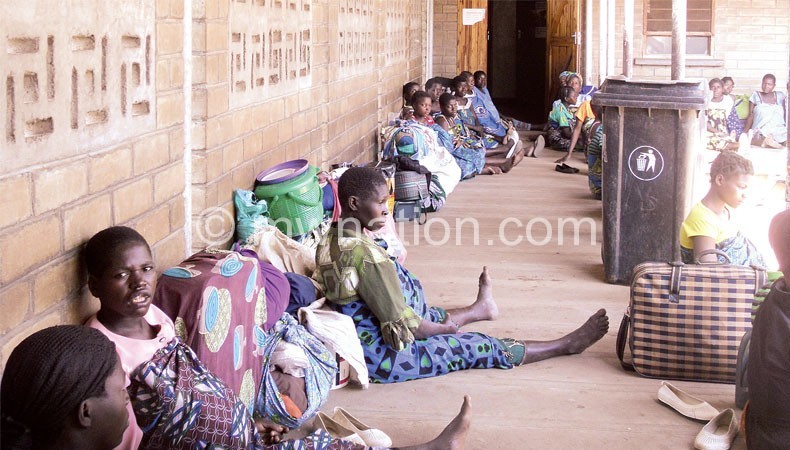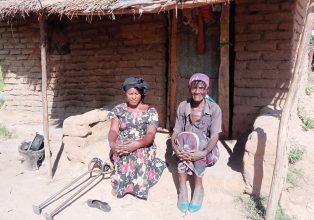Reformed TBAs key to maternal health

Traditional Birth Attendants (TBAS) have moved from banned killers to a lifeline for women and children far from quality health services in Karonga. JAMES CHAVULA writes.
Government bans do not say everything. At least about the role traditional birth attendants play when it comes to reducing deaths of pregnant women and newborns in hard-to-reach localities where healthcare facilities tend to be far apart, ill-equipped and understaffed.
Sifting through chronicles of the global struggle for safe motherhood, United Nations files show every two minutes, a woman dies in pregnancy or childbirth—amounting to 290 000 each year. In Malawi, the Ministry of Health reports that 645 lives are lost in every 100 000 live births, a rate the UN family and population agency, UNFPA, bills among the worst worldwide. Government and health workers often blame the high maternal mortality rates on traditional birth attendants (TBAs) and an agreement is emerging that every baby is safer born at the skilled hands of midwives and other qualified health workers. For the past five years, government has banned the ‘agents of maternal deaths’ and traditional leaders have been fashioning by-laws strengthening the enforcement of the stop-order.
A timely relief, but the tragedy with the new order is that its implementation could be likened to bathing a baby and throwing it away together with the dirty water.
“Our women are dying and we as chiefs have the duty to protect them,” said Chief Mankhumba, Phalombe, of the ‘obey or bust’ enforcement of the localised law tablets born of the conviction that nobody needs to die while giving birth.
Yet by completely abandoning the traditional birth attendants, the nation could be likened to a not-so-streetwise businessperson who moves to a new shop without leaving behind a notice signposting the customers to the new location.
It is against this backdrop that even President Joyce Banda, whose reign has dialed up calls for safe motherhood, seems to support calls for the traditional birth attendants to harness their experience and respectability for a better role.
“I urge all TBAs to stop giving delivery services,” she says, adding: “I believe they can have a good role as referral points.”
Notwithstanding a cry for alternative sources of income and livelihood, the banned birth attendants in the areas of traditional authorities Mwilang’ombe and Wasambo in are playing the good role of reducing maternal deaths by referring pregnant to health facilities.
In the southern stretch of the shoreline district, Foundation for Community Support (Focus), Adventist Health Services and the district’s health office are using a standardised training guidebook developed by the Ministry of Health to turn the traditionalists into vital vessels of life-saving information and skills when it comes to saving mothers and children.
According to Focus project manager, Wakisa Kachali, the initiative funded by the Scottish Government through Christian Aid, springs from the realisation that although the place of traditional birth attendants were banned for causing more harm than good to maternal health, they remain a force to be reckoned in most rural communities.
Kachali says they targeted 50 TBAs, but they have trained 55 of them who have reached out to about 1120 women and made 57 referral at all stages from pregnancy checkups, deliveries and under-five care.
”It’s astonishing the majority of women at the grassroots still trust and consult the TBAs nearly five years after the ban. We are trying to use their influence to make them the agents of the change we need, that no childbirth should be happening in wrong hands,” he said.
However, the TBAs are just a part of an emerging community referral mechanism comprising men as partners in safe motherhood, women corner groups who mentor pregnant and breastfeeding mothers, young voices spreading messages against unprotected sex and early pregnancies among their peers.
Maternal mortality remains a heavy burden in remote areas where nearly one in three Malawians lives. Here, the TBAs typically comprise elderly women—often uneducated, poorly trained and underground personalities—who sometimes use unsafe delivery procedures for most women who drop into their thatched, unsanitary and poorly lit huts in times of labour.
Despite the downside, random interviews at Wovwe Trading Centre, Mwilang’ombe, confirm the unskilled birth consultants still command a lot of respect and reliability among women in underserved areas.
Breastfeeding her latest baby, Monica Msowoya, 28, said: “I have three children, the first two delivered by TBAs. The first time she told me there was nothing to fear and I encountered no problem delivering the twins. As for this baby, I was told to prepare for devastating complications because the baby was not properly positioned and I really had to undergo caesarian operation.”
Tales like the mother-of-three’s buttress the indispensability and trustworthiness of traditional birth attendants especially in areas where gaps in healthcare delivery needs closing.
Most women die due to delays to seek quality healthcare services in these far-flung areas often cut off by poor transport system. The shift in TBAs’ roles means they no longer worsen the fatal delay by experimenting with delivery procedures but avert emergencies beyond their abilities by refer the cases to skilled midwives in time.
As early as 2005, the Ministry of Health’s roadmaps for accelerating the reduction of maternal and neonatal health has been detailing how staff shortage and weak human resource management as well as limited availability and utilization of quality maternal health services are impacting rural populations.
Karonga district integrated maternal and child health coordinator Alfred Nyasulu commends the sign of community participation in safe motherhood d for strengthening linkages between communities and health facilities even in such hard-to-reach areas as Fuliwa, Mphinga and Thabilo.
”Together with existing intervention, the initiative has increased the number of pregnant and breastfeeding women receiving skilled assistance in health centres. As the uptake of care services are increasing at all services, so is awareness and counseling,” said the hospital official.
Christian Aid senior programmes officer Mary Kandikole-Mipnda says the initiative is going according to plan.




